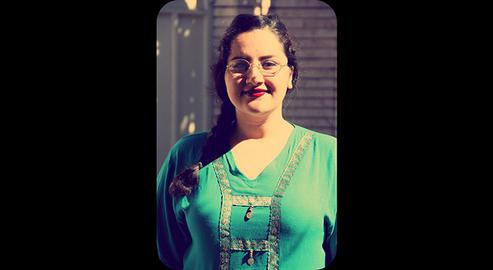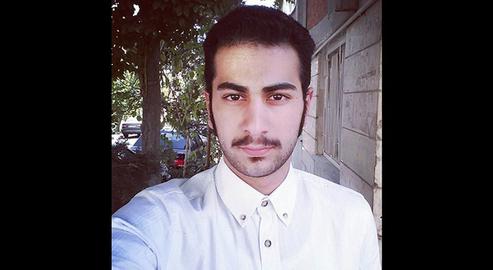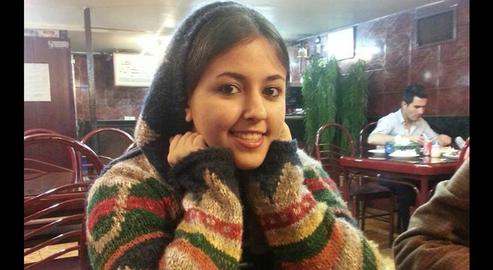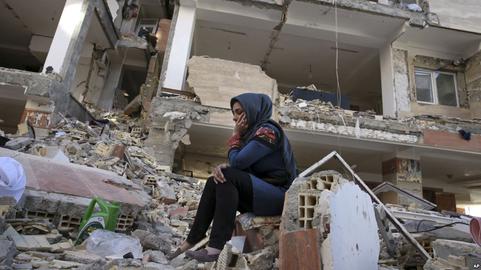The Tehran Revolutionary Court has sentenced three young Baha’is to five years in prison. The formal charges include “acting against national security through membership to the Baha’i deviant sect” and “spreading lies” — but the deciding factor was that they had let others know of the injustice to which they had been subjected.
The three, Rouhieh Safajou, Tara Houshmand and Sarmad Shadabi, were denied a university education in 2015. They were arrested in March 2016 without being told why.
The defendants’ lawyers were informed of the verdict on November 4, 2017. They plan to appeal.
Rouhieh Safajou has expressed her love for learning, the environment and animals. Her biggest wish has been to study for a university degree, but now she may be forced to spend five years behind bars.
“When you are a Baha’i, you get used to deprivation,” Safajou wrote in 2014 after being told she could not attend university. “Deprivation of your basic rights like education, using your talents, going to school for exceptional students, going on stage to conduct an orchestra, having a government job and sometimes even a private one, getting a permit for a restaurant or for an optometry [business]...Sometimes you are even deprived of living in your own place. You might be even deprived of seeing your family in peace for years.”
Twice, in 2014 and 2015, Rouhieh Safajou sat university entrance exams. Both times she was denied entry into higher education. In the first instance, she took entrance exams on March 8, 2014 and was looking forward to the results. On her laptop, she clicked through to the website of the National Testing Organization. But when she entered her details, instead of finding her results, she was presented with an address. She and other Baha’is were given instructions of how they could follow up on their cases. And so began a chain of events that took Safajou and other Baha’i applicants first to the National Testing Organization, then to the Ministry of Science, Research and Technology and to the office of President Rouhani, and later to a meeting with a member of the parliament. Eventually, it led to court and a prison sentence.
“You are Terrorists!”
Having exhausted other avenues to press their demand for justice and equal treatment, Rouhieh Safajou, seven other Baha’i university applicants and two of their parents paid a visit to Alireza Mahjoub, a member of the parliament — a reformist, although you wouldn’t know it by his reaction. The so-called representative of the people did not even give them a chance to speak. “And you call Baha’ism a religion?” he asked them the moment they entered his office. “You are terrorists, each and every one.” Then he shouted at them to get out of his office.
In the end, Rouhieh Safajou was not allowed to enrol at any of Iran’s official universities, so, like many other Baha’is, she decided to continue her education at the Baha’i Institute for Higher Education (BIHE). The Baha’i community established BIHE in 1987 as a peaceful response to the government’s denial of their right to higher education. Thousands of students attend BIHE classes in the homes of Baha’is and via the internet. Many of them have pursued postgraduate work at some of the world’s leading universities, which recognize qualifications completed at the institute. Since its establishment, many teachers for BIHE have been harassed, arrested and imprisoned but, with the internet offering such a scope for outreach and communication, the university continues to be extremely active.
Still, Rouhieh Safajou longed to study at a regular university, a place where she could go to classes and sit next to other students. “The world of being a student means different things to different people,” she wrote in the autumn of 2015, the same year that the doors of universities were closed to her. “For some it means being away from their families. For others it means goals, future, dignity, leaving home early in the morning, eating college food...But for others it means wistfulness, it means unanswered letters, it means leaving home at 6am to go to the Ministry of Science, to the Testing Organization, the president’s office, to the parliament building...it means insults, it means humiliation.”
Safajou has written that the unpleasant meeting with the member of parliament reminded her of another event in her life. She remembers, at age 13, how she she was awakened one night by the voice of her father. “Wait until I wake my wife and my daughter and tell them to wear their hijab,” he had said. A Intelligence Ministry agent had come to take her father away. Her mother pushed her toward her father, and told her: “Say goodbye to your father. You might not see him again.” She remembers how she went to the prison to visit her father, but after waiting for hours she was told that he had been banned from having visitors.
As she waited outside the member of parliament’s office, she remembered all of this. “I had wondered why the agent took my father away and made me cry. Now I understand that he was just obeying orders.”
A Collection of Unanswered Letters
“Being a student [for me],” Safajou wrote, “means a carrying [around] a binder full of unanswered letters and walking in the streets of Tehran while voices go round and round in your head, saying ‘we are just obeying orders. There is nothing we can do. Leave Iran. You are nothing. You are unclean...’”
In August 2014, Rouhieh Safajou addressed Mohammad Javad Larijani on her Facebook page [Persian text]. Larijani is the Iranian Judiciary’s Secretary of High Council for Human Rights and the brother of the Judiciary Chief Sadegh Larijani. “Dear Mr. Larijani,” she wrote. “First, I am a human being and according to human rights laws I have a right to an education. Second, I am an Iranian and according to the constitution I have a right to an education. Third, I am a girl and according to the laws of Ministry of Science I have a right to an education. [But] fourth, I am a Baha’i and according to the laws of Ministry of Science and the Testing Organization I do not have a right to education...Sometimes I am mixed up. Sometimes I am an Iranian and enjoy the rights of Iranians and sometimes I am a Baha’i and do not enjoy the rights of an Iranian or my human rights.”
On Tuesday March 8, 2016, as Iranians prepared for new year celebrations, authorities arrested Rouhieh Safajou, Tara Houshmand and Sarmad Shadabi. “Agents of the Intelligence Ministry,” an informed source told IranWire after the arrests, “who had presented themselves at the door as employees of the gas company, entered the home of Rouhieh Safajou in Karaj [near Tehran]. They searched her home thoroughly and seized her mobile phone, laptop, books, pictures and anything related to the Baha’i religion. Then they arrested Rouhieh and took her to an unknown location.” Her family later learned that she had been taken to Tehran’s Evin Prison.
The Perplexed Judge
The three were released less than a month later pending their trials. Later they were summoned to court six times. The court was only in session for two of the times they were summoned. The fourth time they were summoned (and the first time that the court was in session), the presiding Judge Mohammad Moghiseh was absent. His duties were performed by a replacement judge who was baffled by the case after he heard the defense and asked for the representatives of the prosecutor to come to court and explain why the three had been arrested.
In the second and last session, which took place on September 26, 2017, Judge Moghiseh was present, but there was no representation for the prosecution. Judge Moghiseh has a long record of violating human rights of defendants, including in prominent cases against the Baha’is. In the case of Safajou, Houshmand and Shadabi, he disregarded the replacement judge’s instructions and sentenced each of the three defendants to five years in prison [Persian link], the maximum allowed under Article 499 of the Islamic Penal Code. The code applies to groups that “disturb” the security of the country, although it does not explicitly mention Baha’is.
The verdict does not mention any defense by the defendants or their lawyers. It is possible that the lawyers were not present at the trial, or that they were not allowed to speak, or that Judge Moghiseh intentionally did not include the defense.
“Rouhieh has split feelings toward this verdict,” said a source close to Rouhieh Safajou. “No young person wants to be separated from family and friends for five years, and fall behind in society. But she always says: ‘I don’t like if another young person [has to] experience the same thing. All in all, some have to pay the price so that such painful experiences will not be repeated.’”
visit the accountability section
In this section of Iran Wire, you can contact the officials and launch your campaign for various problems




























comments